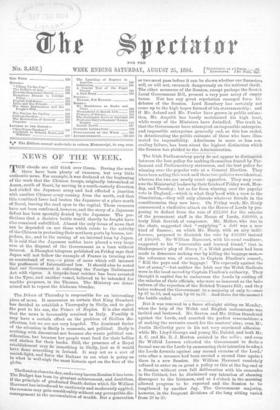The Irish Parliamentary party do not appear to distinguish between
the best policy for making themselves feared by Par- liament and Parliamentary statesmen, and the best policy for winning over the popular vote at a General Election. They have been acting this week as if these two policies were identical, whereas the two are nearly exact opposites. They may over- awe the Ministerial leaders by their freaks of Friday week, Mon- day, and Tuesday; but so far from winning over the popular vote in England,—which is what they tneed with a view to the Dissolution,—they will only alienate whatever friends in the constituencies they now have. On Friday week, Mr. Healy commenced a vindictive attack on the House of Lords by pro- posing to deduct from the vote of £22,000 for the salaries of the permanent staff in the House of Lords, £40,000, a truly Irish flourish of vengeance. Mr. Mellor, who was in the chair, suggested that " supplying " a debt was a new kind of finance ; on which Mr. Healy, with an airy indif- ference, proposed to diminish the vote by £20,000 instead of £40,000. Sir William Harcourt, with his usual readiness, suggested to his "honourable and learned friend," that in Shakespeare's play of Henry V. a Welsh gentleman had been made to denounce making war by killing the baggage-men,-- the reference was, of course, to Captain Fluellen's remark, " Kill the pot's and the luggage ! 'Tis expressly against the law of arms,"—but neither the Irish nor the Welsh Radicals were in the least moved by Captain Fluellen's authority. They thought it capital fun to embarrass the Lords by cutting oil the salaries of their officials, who were as innocent as the babe unborn of the rejection of the Evicted Tenants Bill; and they twice reduced the Government to a majority of only 9,—once by 67 to 58, and again by 66 to 57. And there for the momext the battle ended.
































